外研21英语八年级下测Module 3 Journey to space Unit 3
外研版八年级下册英语《Module 3 Journey to space,Unit 1 Has it

外研版八年级下册英语《Module 3 Journey to space,Unit 1 Has it arrived yet》教学设计一. 教材分析《Module 3 Journey to space, Unit 1 Has it arrived yet》是外研版八年级下册英语教材的一部分,主要讲述了与太空探索相关的话题。
本节课的主要内容是讨论太空探索的进展以及人类对太空的探索是否已经实现。
通过本节课的学习,学生将能够了解太空探索的历史和现状,提高他们的听说读写技能。
二. 学情分析八年级的学生已经具备了一定的英语基础,对于一些基本的词汇和语法结构已经有了一定的了解。
然而,由于太空探索是一个相对较为复杂和抽象的话题,学生可能对此了解不多,因此需要教师在教学中进行适当的引导和解释。
三. 教学目标1.能够理解太空探索的历史和现状。
2.能够运用所学的词汇和语法结构进行相关的口语和书面表达。
3.能够提高他们的听说读写技能。
四. 教学重难点1.能够正确使用一般现在时进行相关的表达。
2.对太空探索的相关词汇和表达的理解和运用。
五. 教学方法本节课将采用任务型教学法,通过各种任务活动,让学生在实践中学习和运用英语。
同时,将采用合作学习法,让学生在小组合作中共同完成任务,提高他们的合作能力和交流能力。
六. 教学准备1.教材和教师用书。
2.与太空探索相关的图片和视频资料。
3.录音机和录音带。
七. 教学过程1.导入(5分钟)通过展示一些与太空探索相关的图片和视频资料,引起学生的兴趣,并引导学生思考太空探索的意义和目的。
2.呈现(10分钟)教师通过展示教材中的图片和文字,引导学生观察和描述太空探索的进展。
同时,教师通过提问,引导学生思考人类对太空的探索是否已经实现。
3.操练(15分钟)学生分组进行角色扮演,模拟太空探索的情景,运用所学的词汇和语法结构进行相关的表达。
教师通过提问和反馈,帮助学生巩固所学的内容。
4.巩固(10分钟)学生进行小组讨论,分享各自的观点和看法,教师通过提问和反馈,帮助学生进一步巩固所学的内容。
外研版英语八下Module3《Journeytospace》(Unit3)说课稿

外研版英语八下Module 3《Journey to space》(Unit 3)说课稿一. 教材分析《Journey to space》(Unit 3)是外研版英语八下的一个单元,本节课的主要内容是关于太空探索的知识。
教材通过讲述人类对太空的探索历程,让学生了解太空的基本知识,提高他们对科学探索的热情。
教材内容丰富,插图生动,有利于激发学生的学习兴趣。
二. 学情分析根据我对学生的了解,他们在学习过程中对新鲜事物充满好奇,善于接受新知识。
但同时,他们对英语词汇和语法知识的掌握程度参差不齐。
因此,在教学过程中,我需要关注每一个学生的学习进度,尽量让每个人都有所收获。
三. 说教学目标1.知识目标:让学生掌握太空探索的基本知识,了解人类对太空的探索历程。
2.能力目标:培养学生运用英语描述和讨论太空探索的能力。
3.情感目标:激发学生对科学探索的热情,培养他们积极向上的精神风貌。
四. 说教学重难点1.重点:让学生掌握太空探索的基本知识和相关词汇。
2.难点:引导学生运用英语描述和讨论太空探索的过程,提高他们的语言表达能力。
五. 说教学方法与手段1.情境教学法:通过设定太空探索的情境,让学生在实际语境中学习英语。
2.任务型教学法:引导学生参与各种任务,提高他们的实践能力。
3.多媒体教学手段:运用课件、视频等多媒体资源,丰富教学内容,提高学生的学习兴趣。
六. 说教学过程1.导入:通过展示太空探索的图片,引导学生谈论太空,激发他们的学习兴趣。
2.新课呈现:讲解太空探索的基本知识,让学生了解人类对太空的探索历程。
3.课堂实践:学生进行小组讨论,让他们运用英语描述和讨论太空探索的过程。
4.巩固练习:通过完成相关练习题,检查学生对知识的掌握程度。
5.课堂小结:总结本节课的主要内容,提醒学生课后进行复习。
七. 说板书设计板书设计要简洁明了,突出本节课的主要内容。
可以设计成思维导图的形式,将太空探索的基本知识和人类探索历程呈现出来。
外研版英语八下Module 3《Journey to space》(Unit 1)教学设计

外研版英语八下Module 3《Journey to space》(Unit 1)教学设计一. 教材分析《Journey to space》(Unit 1)是外研版英语八下的一个单元,主要讲述了人类对太空的探索和了解。
本单元的话题富有时代感,能够激发学生学习英语的兴趣,同时提高他们的科学素养。
教材内容主要包括:词汇、对话、阅读理解、语法、写作等。
本节课我们将重点讲解词汇、对话和阅读理解。
二. 学情分析八年级的学生已经具备了一定的英语基础,对于日常生活中的话题能够进行简单的交流。
但太空这一话题较为专业,学生可能对某些词汇和表达感到陌生。
因此,在教学过程中,教师需要关注学生的学习需求,调整教学策略,帮助学生更好地理解和掌握知识。
三. 教学目标1.知识目标:学生能够掌握本节课的生词和短语,理解对话和阅读材料的内容,运用所学的语法知识进行表达。
2.能力目标:学生能够在日常生活中运用所学英语进行交流,提高听、说、读、写的综合能力。
3.情感目标:学生能够激发对太空探索的兴趣,培养科学精神。
四. 教学重难点1.重点:生词和短语的学习,对话和阅读材料的理解。
2.难点:太空相关术语的理解,语法知识的运用。
五. 教学方法1.任务型教学法:通过设定各种任务,让学生在实践中学习英语,提高语言运用能力。
2.情境教学法:创设真实的太空探索情境,激发学生的学习兴趣。
3.合作学习法:鼓励学生分组讨论,培养团队协作能力。
六. 教学准备1.教师准备:备好课件、教学素材、作业等。
2.学生准备:预习生词和短语,了解太空探索的基本知识。
七. 教学过程1.导入(5分钟)教师通过展示太空图片,引导学生谈论太空探索的话题,激发学生的学习兴趣。
2.呈现(10分钟)教师呈现本节课的生词和短语,引导学生跟读,讲解单词和短语的意思。
3.操练(15分钟)教师设计各种练习,让学生运用所学的生词和短语进行表达,如填空、连线等。
4.巩固(10分钟)教师学生进行小组讨论,运用所学的知识进行太空探索话题的交流。
外研版英语八下_Module 3 知识点详解及挖空
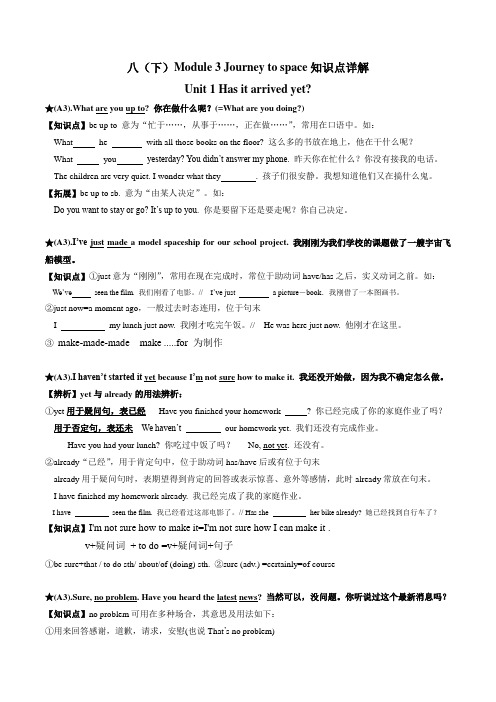
八(下)Module 3 Journey to space知识点详解Unit 1 Has it arrived yet?★(A3).What are you up to? 你在做什么呢?(=What are you doing?)【知识点】be up to 意为“忙于……,从事于……,正在做……”,常用在口语中。
如:What he with all those books on the floor? 这么多的书放在地上,他在干什么呢?What you yesterday? You didn’t answer my phone. 昨天你在忙什么?你没有接我的电话。
The children are very quiet. I wonder what they . 孩子们很安静。
我想知道他们又在搞什么鬼。
【拓展】be up to sb. 意为“由某人决定”。
如:Do you want to stay or go? It’s up to you. 你是要留下还是要走呢?你自己决定。
★(A3).I’ve just made a model spaceship for our school project. 我刚刚为我们学校的课题做了一艘宇宙飞船模型。
【知识点】①just意为“刚刚”,常用在现在完成时,常位于助动词have/has之后,实义动词之前。
如:We’ve seen the film. 我们刚看了电影。
// I’ve just a picture-book.我刚借了一本图画书。
②just now=a moment ago,一般过去时态连用,位于句末I my lunch just now. 我刚才吃完午饭。
// He was here just now. 他刚才在这里。
③make-made-made make .....for 为制作★(A3).I haven’t started it yet because I’m not sure how to make it. 我还没开始做,因为我不确定怎么做。
外研版英语八下Module 3《Journey to space》(Unit 3)教学设计

外研版英语八下Module 3《Journey to space》(Unit 3)教学设计一. 教材分析《Journey to space》是外研版英语八年级下册Module 3的一篇课文,主要介绍了太空探索的历史、现状和未来。
本文通过讲述人类对太空的探索过程,使学生了解太空知识,激发他们对科学的热爱和好奇心。
课文内容丰富,语言简练,插图生动,适合学生学习。
二. 学情分析八年级的学生已经具备了一定的英语基础,对太空有一定的了解。
但他们在阅读长篇文章时,可能会遇到生词和复杂句子结构的障碍。
因此,在教学过程中,教师需要帮助学生克服这些困难,提高他们的阅读理解能力。
三. 教学目标1.知识目标:学生能够掌握课文中的生词和短语,理解课文大意,了解太空探索的历史、现状和未来。
2.能力目标:学生能够运用所学知识,进行口语交流和写作表达。
3.情感目标:培养学生对科学的热爱和好奇心,提高他们的综合素质。
四. 教学重难点1.重点:课文内容的掌握,生词和短语的学习。
2.难点:复杂句子结构的理解,口语表达和写作能力的提高。
五. 教学方法1.任务型教学法:通过完成各种任务,让学生在实践中学习英语。
2.情境教学法:创设生动的情境,激发学生的学习兴趣。
3.合作学习法:鼓励学生分组讨论,培养团队协作能力。
六. 教学准备1.课文录音:为学生提供听力材料,提高他们的听力能力。
2.教学课件:制作课件,辅助教学,使课堂更加生动有趣。
3.相关资料:收集与太空探索相关的资料,用于拓展学生的知识面。
七. 教学过程1.导入(5分钟)教师播放太空探索的短视频,引导学生谈论对太空的了解和兴趣,为新课的学习营造氛围。
2.呈现(10分钟)教师展示课文图片,引导学生观察并猜测课文内容。
然后逐段呈现课文,让学生跟读并模仿语音语调。
3.操练(10分钟)教师设计各种任务,如填空、选择、问答等,让学生分组完成,巩固课文内容。
4.巩固(5分钟)教师学生进行角色扮演,模拟太空探索的场景,提高他们的口语表达能力。
2017-2018学年外研版八年级英语下册Module3Journeytospace教案

一、教学内容
本节课选自2017-2018学年外研版八年级英语下册Module 3 Journey to space。教学内容主要包括以下章节:
1. Unit 1: Has it arrived yet?
-学习询问和描述物体位置的句型。
-实际情境对话:学生在实际对话中可能难以将所学语法和词汇灵活运用。
-难点举例:在小组讨论中,学生可能不知道如何使用合适的时态和词汇来讨论一个假想的太空旅行。
四、教学流程
(一)导入新课(用时5分钟)
同学们,今天我们将要学习的是《Journey to Space》这一章节。在开始之前,我想先问大家一个问题:“你们是否想象过成为宇航员,探索未知的宇宙?”这个问题与我们将要学习的内容密切相关。通过这个问题,我希望能够引起大家的兴趣和好奇心,让我们一同探索太空的奥秘。
其次,在新课讲授环节,我发现有些同学在理解一般过去时、现在完成时和一般将来时方面存在一定的困难。针对这个问题,我在课堂上通过举例和对比进行了详细的解释,希望同学们能够更好地掌握这些语法知识点。在今后的教学中,我还需要多关注这部分学生的掌握情况,加强个别辅导。
此外,实践活动中的分组讨论和实验操作,让同学们将所学知识应用到实际情境中,提高了他们的动手能力和团队协作能力。从成果展示来看,大部分同学能够运用所学词汇和语法进行讨论和表达,达到了教学目标。
4. Unit 4: A comet is coming to visit the Earth.
-学习描述天体和天文现象的词汇。
-运用一般将来时描述即将发生的事件。
二、核心素养目标
本章节的核心素养目标主要包括:
Module 3 Journey to space-最新外研版八年级英语下册各模块作文(含范文、好词好句名言集锦)(解析版)

Module 3 Journey to spaceWriting 1随着时代的进步、科技的发展,人们的生活发生了日新月异的变化。
未来的生活将会是什么样子的呢?谁都无法预料。
请发挥想象,谈一谈未来的日子里,将有哪些不可思议的变化。
如:很多事情由机器人或计算机完成、在家购物、足不出户旅行……请以“The life we can’t imagine”为题写一篇短文。
______________________________________________________________________________________ ______________________________________________________________________________________ ______________________________________________________________________________________ ______________________________________________________________________________________ ______________________________________________________________________________________ ______________________________________________________________________________________ ______________________________________________________________________________________ ______________________________________________________________________________________ 【参考范文】The life we can’t imagineWhat do you think of the life in the future will be like?In the future there will be more computers in our houses. Computers will help us to know a lot about the world. We will be able to talk by e-mail. Scientists will make many robots. Robots can help us do the cleaning, cooking and washing. We can do some shopping or see a doctor without going out of our houses.The life in the future will be very good. For this, we will study hard and turn our ideas into reality. I believe we will be able to do this.Writing 2假设你现在在2092年,你是Betty,生活在火星上,你的朋友Jack生活在地球上,不久他也将来火星上生活。
外研版英语八下Module3《Journeytospace》(Unit2)说课稿

外研版英语八下Module 3《Journey to space》(Unit 2)说课稿一. 教材分析《Journey to space》(Unit 2)是外研版英语八下的一个单元,本单元的主题是关于太空探索。
通过本单元的学习,学生可以了解人类对太空的探索历程,掌握相关的词汇和语法知识,提高英语听说读写的能力。
本单元的主要内容包括:阅读一篇关于太空探索的短文,听一个关于太空探索的听力材料,以及完成一个关于太空探索的写作任务。
二. 学情分析在进入本单元的学习之前,学生已经学习了一些与科技相关的英语知识,对太空探索有一定的了解。
然而,由于太空探索是一个复杂而深奥的领域,学生可能需要更多的帮助来理解相关的概念和术语。
此外,由于本单元的学习内容较为复杂,学生可能需要更多的练习来巩固所学的知识。
三. 说教学目标本单元的教学目标包括:1.学生能够理解并运用与太空探索相关的词汇和短语。
2.学生能够理解并运用与太空探索相关的语法知识。
3.学生能够听懂并理解与太空探索相关的听力材料。
4.学生能够阅读并理解与太空探索相关的短文。
5.学生能够完成与太空探索相关的写作任务。
四. 说教学重难点本单元的教学重难点包括:1.与太空探索相关的词汇和短语的理解和运用。
2.与太空探索相关的语法知识的理解和运用。
3.听懂并理解与太空探索相关的听力材料。
4.阅读并理解与太空探索相关的短文。
5.完成与太空探索相关的写作任务。
五. 说教学方法与手段在本单元的教学中,我将采用以下教学方法与手段:1.任务型教学法:通过完成各种任务,激发学生的学习兴趣,提高学生的学习积极性。
2.情境教学法:通过创设各种情境,帮助学生理解和学习与太空探索相关的知识。
3.视听教学法:通过播放与太空探索相关的视听材料,帮助学生更好地理解和学习与太空探索相关的知识。
4.小组合作学习:通过小组合作学习,培养学生的合作能力和团队精神。
六. 说教学过程本单元的教学过程包括以下几个环节:1.导入:通过播放一段与太空探索相关的视听材料,激发学生的学习兴趣,引入本单元的学习内容。
外研版英语八年级下册Module3 Journey to space单元试题及答案带听力原文

外研版英语八年级下册Module3 Journey to space单元试题一、听力(听力)(共15小题;共15分)Ⅰ. 听句子,选出与所听内容相符的图片。
每个句子读一遍。
(5分)Ⅱ. 听对话,选择正确的答案。
每段对话读两遍。
(5分)6. What news is the girl listening to?A. About NASA.B. About Shenzhou Ⅶ.C. About Shenzhou Ⅹ.7. Where has the spaceship taken several months to get to?A. The moon.B. Mars.C. The sun.8. Why haven't the scientists spoken to the astronauts?A. Because the astronauts haven't come back.B. Because it's a manned mission.C. Because it's an unmanned mission.9. How many times have astronauts been to the moon?A. Lots of times.B. Few times.C. Several times.10. How do the astronauts get to the space station?A. By plane.B. By rocket.C. By spaceship.Ⅲ. 听短文,选择正确的答案。
短文读两遍。
(5分)11. How much have people known about the moon from space missions?A. A little.B. A lot.C. A few.12. When did astronauts first landed on the moon?A. In 1959.B. In 1969.C. In 1972.13. How did the men travelled to the moon?A. By plane.B. By spaceship.C. By ship.14. How long did the journey there take?A. Two days.B. Two weeks.C. Two months.15. Did they find any life on the moon?A. Yes, they didn't.B. Yes, they did.C. No, they didn't.二、单项选择(共10小题;共10分)16. I don't want to see the film The Hobbit II because I it already.A. has seenB. sawC. have seenD. had seen17. --- Where is your mother?--- She Guiyang.A. has gone toB. has been toC. has been inD. went to18. It's for him to finish so much homework in so little time.A. importantB. impossibleC. interestingD. humorous19. --- I can't stand my parents. They always ask me to learn this and practice that.--- Why don't you sit down and them?A. compete withB. instead ofC. get on withD. communicate with20. --- Did you know who tea?--- The emperor Shennong did.A. foundB. discoveredC. found outD. invent21. — Are you going to further your studies after graduation?— Well, I yet. I might make some other choices.A. didn't decideB. haven't decidedC. don't decidedD. hadn't decided22. --- What are you going to do this Saturday?--- I yet.A. haven't decidedB. won't decideC. am not decidedD. didn't decide23. --- Could you please help me put up these signs?--- .A. Thanks a lotB. No problemC. It's a pleasureD. It's very kind of you24. --- I'm hungry. Is there any bread in the fridge?--- , but we have cakes. Would you like to have one?A. SomeB. MuchC. NoneD. Nothing25. When they here, we were having a sports meeting.A. reachedB. got toC. arrived inD. arrived at三、单词拼写(单句首字母填空)(共10小题;共10分)26. In China Hope P helps a great number of kids return school.27. The discovery of a new p has been reported.28. He wants to r for the apples on the table, because he is hungry.29. The scientists haven't d any life on Mars yet.30. There is the earth, the sun, the moon and many other stars in the u .31. This is his l photograph but not his last one.32. Last Sunday they flew their m planes in the park.33. When I grow up, I want to be an a like Yang Liwei.34. --- How do you c with your friends?--- By e-mails.35. Don't throw litters away. We should protect our e .四、单词拼写(根据中文提示拼写单词)(共8小题;共8分)36. Peter has a (模型) plane.37. After two hours' walk, we at last (到达) a small mountain village.38. After you argue with your parents you must (交流) with them and explain why you did that.39. Have you read the (最近的) news about the accident?40. My (课题) is about how to learn math.41. --- We should plant more trees to protect our ( 环境).--- I agree with you.42. --- When did Columbus (发现) America?--- In 1492.43. On 12th Oct 2005 Shenzhou Ⅵ took two Chinese (宇航员) into space.五、翻译(根据中文提示完成句子)(共5小题;共10分)44. 怀特先生生活在北京已经3年了。
八年级英语外研社下册Module 3 Journey to space 学案
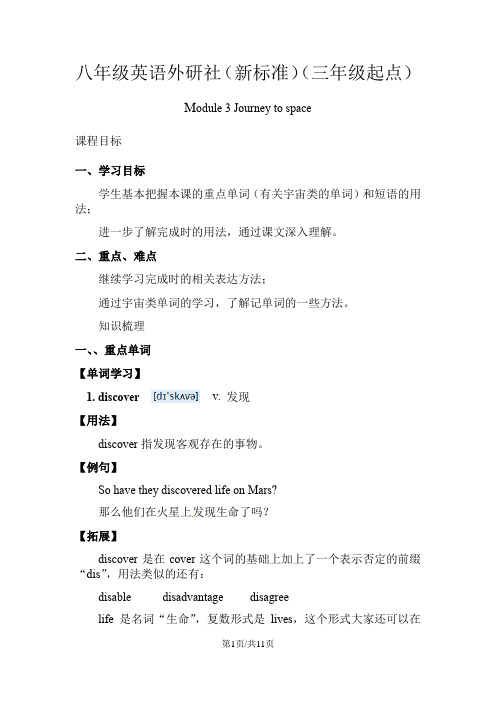
八年级英语外研社(新标准)(三年级起点)M odule 3 Journey to space课程目标一、学习目标学生基本把握本课的重点单词(有关宇宙类的单词)和短语的用法;进一步了解完成时的用法,通过课文深入理解。
二、重点、难点继续学习完成时的相关表达方法;通过宇宙类单词的学习,了解记单词的一些方法。
知识梳理一、、重点单词【单词学习】1. discover v. 发现【用法】discover指发现客观存在的事物。
【例句】So have they discovered life on Mars?那么他们在火星上发现生命了吗?【拓展】discover是在cover这个词的基础上加上了一个表示否定的前缀“dis”,用法类似的还有:disable disadvantage disagreelife是名词“生命”,复数形式是lives,这个形式大家还可以在live的三单中见到:She lives in Beijing.(居住)The doctors saved a lot of lives during the war.(生命)【考题链接】请根据构词法猜测下面单词的含义:disbelieve disapprove discontinue答案:不信,不同意,中止思路分析:根据单词构造的特点很容易得到答案。
2. information n. 信息☆☆☆【用法】information是不可数名词,泛指消息。
因此“一条消息”应该是a piece of information。
【例句】How can I get information on space travel?我怎么才能得到关于太空旅行的消息呢?【拓展】news同样也是不可数名词,多指新闻事件。
“一条新闻”应该是a piece of news;message则是手写或谈话类的消息,为可数名词。
【考题链接】请用news,information和message填空[来源:]1. If you need any ___________ about the trip, ask him.2. Have you heard the ___________? The President will come to our school.3. They send me a text ____________ by the mobile phone.答案:information, news, message思路分析:根据几个词的使用特性可得到答案。
外研版初中英语八下Module 3 Journey to space Unit 3

6. 为的是
in order to
7. 有一天
one day
8. 航天旅行
space travel
Remember the key phrases
9. 上网
go online
10. 搜索
search for
11. 成百上千的
hundreds of
12. 数百万的
millions of
13. ...中没有一个
none of
14. 星系
solar system
15. 数十亿的
billions of
16. 与...联系
communicate with
Language practice
just 表示“刚才,方才”,一般用于肯定句中。
1. I’ve just made a model spaceship.
2. Has it arrived yet?
In July 1969, Neil Armstrong became the first (1)__a_s_t_r_o_n_a_u_t__ to walk on the (2)_m__o_o_n___. People all around the world watched their televisions and waited for the (3) _n_e_w__s___ to (4)__r_e_a_c_h___ the earth. We have now (5)__d_i_sc_o_v_e_r_e_d_ a lot more about our solar system, and we have sent (6)__s_p_a_c_e_s_h_ip__ to Mars, but no one has walked on that planet (7)____y_e_t______. But I believe one day someone will!
2021春外研版八年级英语下册 Module 3 背记手册+测试卷
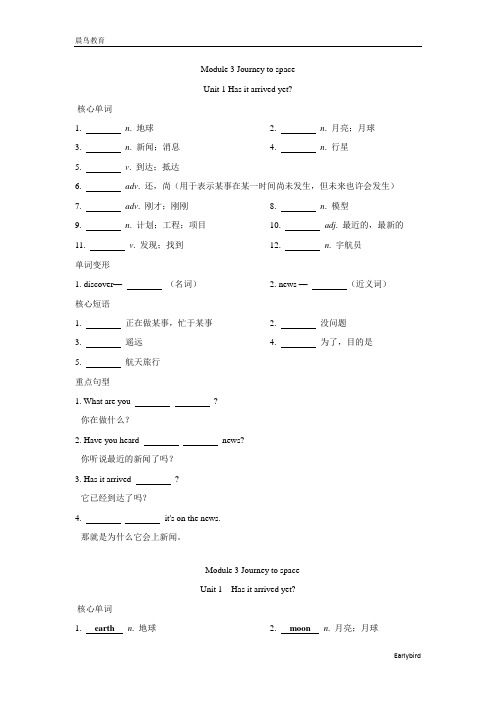
Module 3 Journey to spaceUnit 1 Has it arrived yet?核心单词1. n. 地球2. n. 月亮;月球3. n. 新闻;消息4. n. 行星5. v. 到达;抵达6. adv. 还,尚(用于表示某事在某一时间尚未发生,但未来也许会发生)7. adv. 刚才;刚刚8. n. 模型9. n. 计划;工程;项目10. adj. 最近的,最新的11. v. 发现;找到12. n. 宇航员单词变形1. discover—(名词)2. news —(近义词)核心短语1. 正在做某事,忙于某事2. 没问题3. 遥远4. 为了,目的是5. 航天旅行重点句型1. What are you ?你在做什么?2. Have you heard news?你听说最近的新闻了吗?3. Has it arrived ?它已经到达了吗?4. it's on the news.那就是为什么它会上新闻。
Module 3 Journey to spaceUnit 1Has it arrived yet?核心单词1. earth n. 地球2. moon n. 月亮;月球3. news n. 新闻;消息4. planet n. 行星5. reach v. 到达;抵达6. yet adv. 还,尚(用于表示某事在某一时间尚未发生,但未来也许会发生)7. just adv. 刚才;刚刚8. model n. 模型9. project n. 计划;工程;项目10. latest adj. 最近的,最新的11. discover v. 发现;找到12. astronaut n. 宇航员单词变形1. discover—discovery(名词)2. news —message(近义词)核心短语1. be up to sth. 正在做某事,忙于某事2. no problem没问题3. far away遥远4. in order to为了,目的是5. space travel航天旅行重点句型1. What are you up to?你在做什么?2. Have you heard the latest news?你听说最近的新闻了吗?3. Has it arrived yet?它已经到达了吗?4. That's why it's on the news.那就是为什么它会上新闻。
新外研八年级下 Module 3 Journey to space
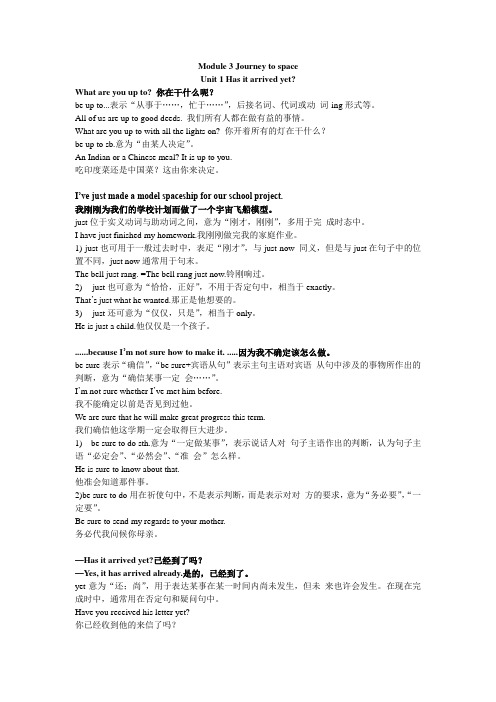
Module 3 Journey to spaceUnit 1 Has it arrived yet?What are you up to? 你在干什么呢?be up to...表示“从事于……,忙于……”,后接名词、代词或动词-ing形式等。
All of us are up to good deeds. 我们所有人都在做有益的事情。
What are you up to with all the lights on? 你开着所有的灯在干什么?be up to sb.意为“由某人决定”。
An Indian or a Chinese meal? It is up to you.吃印度菜还是中国菜?这由你来决定。
I’ve just made a model spaceship for our school project.我刚刚为我们的学校计划而做了一个宇宙飞船模型。
just位于实义动词与助动词之间,意为“刚才,刚刚”,多用于完成时态中。
I have just finished my homework.我刚刚做完我的家庭作业。
1) just也可用于一般过去时中,表疋“刚才”,与just now 同义,但是与just在句子中的位置不同,just now通常用于句末。
The bell just rang. =The bell rang just now.铃刚响过。
2) just也可意为“恰恰,正好”,不用于否定句中,相当于exactly。
That’s just what he wanted.那正是他想要的。
3) just还可意为“仅仅,只是”,相当于only。
He is just a child.他仅仅是一个孩子。
......because I’m not sure how to make it. .....因为我不确定该怎么做。
be sure表示“确信”,“be sure+宾语从句”表示主句主语对宾语从句中涉及的事物所作出的判断,意为“确信某事一定会……”。
(完整版)外研版八年级下册英语Module3Journeytospace知识点讲解与练习(有答案)

Module 3 Journey to space1.shelf/ʃelf/n.隔板;架子【考点分析】shelf为可数名词,其复数形式为shelves。
【拓展】可数名词以f/fe 结尾的,要把f/fe 改为v,再加es【例题】There are two __________________(刀)and three forks on the desk.【knives】2.most of ……中的大多数【考点分析】most of 修饰主语时谓语动词的单复数不可数名词——接单数谓语动词most of +复数名词——接复数谓语动词eg. Most of the time has gone. 大部分时间已经过去了。
Most of them are leaving for Guangzhou. 他们中的大多数人要去广州。
【例题】Most of the food delicious in the restaurant. 【C】A.tasteB.soundC.tastesD.sounds3.(高频)must一定,必定【考点分析】辨析must,may和can't【例题】—Are the glasses Tim's?—No,they _________ be his.He doesn't wear glasses. 【D】A.mustB.canC.mustn'tD.can't4.show sb. sth.向某人展示某物【考点分析】表示“向某人展示某物”有两种说法:show sb.sth.=show sth.to sb.表示方向性的动词后跟双宾语时,表人的宾语(即间接宾语)放在直接宾语后面时,前面要加介词to或for。
eg:Please show that letter to me. 请把那封信拿给我看看。
【例题】同义句转换。
She showed us her new sweater last week.She showed her new sweater__________ ___________ last week. 【to us】5.with /wIð/prep.用……【考点分析】with介词,常见用法见下表:表示“和”,后跟代词或名词。
外研21英语八年级下测Module 3 Journey to space Unit 2
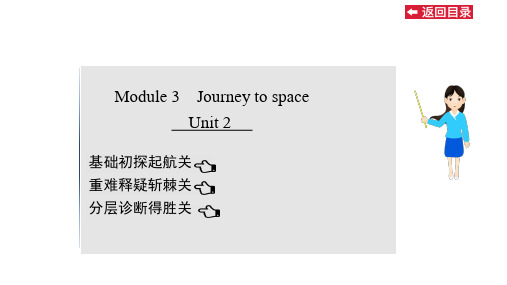
birds fly to Dongting Lake in
winter.
lion
lions
lions of
( C )③(2020·厦门模拟)China has a history of more than five
years.
A.thousands ofB.tBiblioteka ousands重难释疑斩棘关
考点1 Scientists think that there has been life on the earth for hundreds of millions of years. 科学家认为地球上的生命已有亿万年的历史了。(P20) 【句式·研析】 本句是含有宾语从句的主从复合句,其句子结构如下图所示:
_o_u_t
5.数百的
_h_u_n_d_r_e_d_s _o_f_
6.数百万的
_m_i_l_li_o_n_s_o_f_
7.数十亿的
_b_il_l_io_n_s__o_f
8.在太空
_in__s_p_a_c_e_
9.去了
_h_a_v_e_g_o_n__e_t_o_
10.和某人交流 _c_o_m__m_u_n_i_c_a_t_e_w_i_t_h_s_b_._
【句式·追踪】
( A )①(2020·桂林中考) There
a computer and some books on the
teacher’s desk.
A.is
B.are
C.be
( C )②(2019·临沂中考)—I’m getting hungry. Do you know where we can
4.太阳和它的行星被称为太阳系。 The sun and its planets _a_r_e _c_a_ll_e_d_ the solar system. 5.那是无法想象的。 _I_t _is_ _i_m_p_o_s_s_ib__le_ _to_ _im__a_g_in__e.
2021外研版英语八下Module3《Journeytospace》word教案
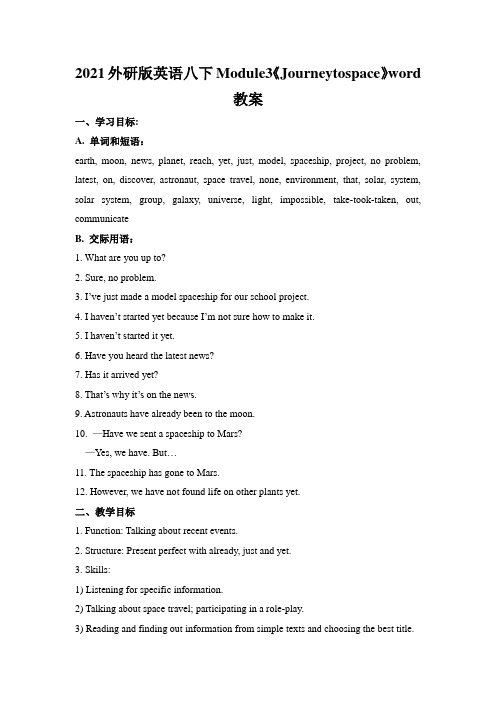
2021外研版英语八下Module3《Journeytospace》word教案一、学习目标:A. 单词和短语:earth, moon, news, planet, reach, yet, just, model, spaceship, project, no problem, latest, on, discover, astronaut, space travel, none, environment, that, solar, system, solar system, group, galaxy, universe, light, impossible, take-took-taken, out, communicateB. 交际用语:1. What are you up to?2. Sure, no problem.3. I’ve just made a model spaceship for our school project.4. I haven’t started yet because I’m not sure how to make it.5. I haven’t s tarted it yet.6. Have you heard the latest news?7. Has it arrived yet?8. That’s why it’s on the news.9. Astronauts have already been to the moon.10. —Have we sent a spaceship to Mars?—Yes, we have. But…11. The spaceship has gone to Mars.12. However, we have not found life on other plants yet.二、教学目标1. Function: Talking about recent events.2. Structure: Present perfect with already, just and yet.3. Skills:1) Listening for specific information.2) Talking about space travel; participating in a role-play.3) Reading and finding out information from simple texts and choosing the best title.4) Writing a passage to describe the picture.4. Around the world: Names of the days of the week.5. Task: Making a poster about space travel.三、重点及难点:1. Structure: Present perfect with already, just and yet.2. To understand the difference between have been to and have gone to.四、教学设计:Unit 1 Has it arrived yet?ⅠTeaching modelListening and speakingⅡTeaching methodPWP approachⅢ Teaching aims1. To understand Present perfect with already, just and yet.2. To understand the conversation about the space mission to Mars.3. To understand the difference between have been to and have gone to.Ⅳ Teaching Objectives1. Key vocabulary: earth, moon, news, planet, reach, yet, just, model, spaceship,project, no problem, latest, on, discover, astronaut, space travel 2. Key structures:Present perfect with already, just and yet.Ⅴ Teaching aidsTape recorder, OHP, videoⅥTeaching StepsStep 1 Warming up1. Enjoy news report and watch a video.2. Show some pictures to introduce the new words.3. Learn the new words.4. Read the new words.Step 2 Listen and number the words as you hear them.1. Ask the students to read the words in Activity 1.2. Play the recording.3. Listen and number the words as you hear them.4. Ask the students to check their answer with a partner.5. Call back the answer from the whole class and check the answer.Step 3 Listen again and complete the notes.1. Ask the students to read the notes in Activity2.news about the trip to (1) ____________journey of (2) __________ monthshas not sent back any (3) ___________ yethope to find (4) ____________ on Mars2. Listen again and complete the notes.3. Ask the students to check their answer with a partner.4. Call back the answer from the whole class and check the answer.keys: Mars eight messages lifeStep 4 Listen and read.1. Show some pictures, and ask the students to talk about them.2. Ask the students to read the conversation silently.3. Play the recording and ask the students to listen and read the conversation.4. Read the conversation.5. Act it out.6. Learn “Everyday English”1) What are you up to?2) Sure, no problem.Step 5 Now answer the questions.1. Ask the students to read through the questions in Activity3.1) What school project have Daming and Tony got?2) How does Daming feel about the school project?3) What news has Tony heard?4) Has anyone been to Mars? Why?2. Ask the students to read through the conversation in Activity 3 again.3. Answer the questions.4. Check with a partner.5. Call back the answers from the whole class.Keys:They have got a project on spaceships.He’s not sure how to make the mode l.The spaceship to Mars has reached there.No one has been to Mars yet, because Mars is very far away, much farther thanthe moon.Step 6 Complete the passage in Activity 4.1. Ask the students to read the words in the box in Activity 4.2. Ask the students to read through the passage in Activity 4.On today’s news, Tony has heard that scientists have (1) _________ a spaceship to Mars and it has (2) ________ on the (3) _________ after a journey of several months from the earth. Scientists have not (4) _________ life on Mars (5) ________. And no astronaut has ever been to Mars because it is very far away.3. Complete the passage with the correct form of the words in the box.4. Check with a partner.5. Call back the answers from the whole class.Keys: 1. sent 2. arrived 3. planet 4. discovered 5. yet6. Read the passage together.Step 7 Language points.1. What are you up to? 你在做什么呢?up to 表示“正在干,从事着”。
英语外研八年级下册Module 3 Journey to space
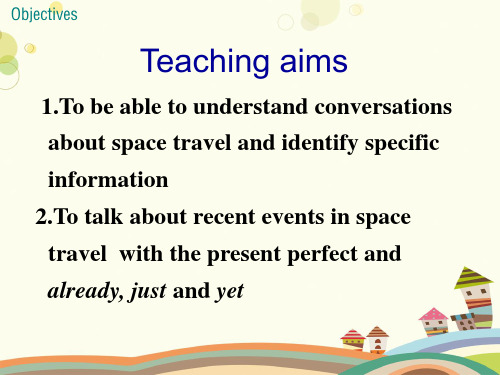
3. What news has Tony heard?
Some scientists have sent a spaceship to Mars.
4. Has anyone been to Mars? Why?
No one. Because Mars is very far away, much farther than the moon.
Earth moon news planet reach yet
n. 地球 n. 月亮,月球 n. 新闻,消息 n. 行星 v. 到达;抵达 adv. 还,尚
5
model Mars spaceship discover astronaut space travel
n. 模型
n. 火星 n. 航天器宇宙飞船 v. 发现,找到 n. 宇航员 航天旅行
1 1
4 Complete the passage with the correct form of the words in the box.
arrive discover plane send yet
In today’s news, Tony has heard that ists have (1)_s_e_n_t___a spaceship to Mars and it has (2)____a_r_r_iv_e_d_ on the (3)______p_la_n_e__after a journey of several months from the earth. Scientists have not (4)_________d_is_c_o_velifredon Mars (5)_______. Aynedt no astronaut has ever been to Mars because it is far away.
2021年外研版八年级英语下册Module 3 Journey to space精品课件
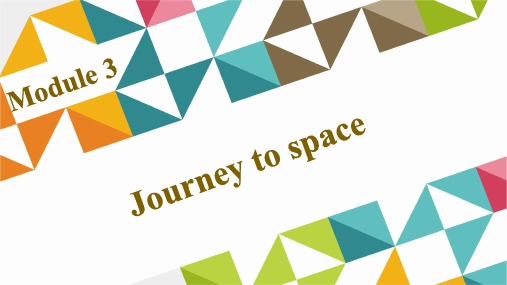
D.get in
A18.—Is air the lightest thing in the world?
—Not ________. Scientists from Zhejiang University have
just developed the world's lightest material.
A.now
B.yet
C.then
D.again
D 19 . Li Ming has a good habit of reading English
________every day.
A.knowledge B.information
C.advice
D.news
B 20 . (2015 , 营 口 )—Lisa, why are you still here?
27.___A_____ B:No,it's the name of a book. It's about space travel. A:I see. 28.___E_____ B:No,I haven't. I'm not interested in space travel. A:But there are too many people on the earth.29.___B_____ B:So you want to know something about Mars,right? A:Yes. Have you heard the latest news?A spaceship has
young. 23.——放学后,你能帮助我学英语吗? ——没问题。
—Can you help me with my English after school?
- 1、下载文档前请自行甄别文档内容的完整性,平台不提供额外的编辑、内容补充、找答案等附加服务。
- 2、"仅部分预览"的文档,不可在线预览部分如存在完整性等问题,可反馈申请退款(可完整预览的文档不适用该条件!)。
- 3、如文档侵犯您的权益,请联系客服反馈,我们会尽快为您处理(人工客服工作时间:9:00-18:30)。
Ⅲ.单项选择
( C )1.(2020·天津中考) —The book is popular.
you
it yet?
—Yes, I have.
A.Are; reading
B.Were; reading
C.Have; read
D.Will; read
( D )2.Wow! You
dinner! Let’s eat now.
( C )5.—Peggy, would you like to see the flower show with me tomorrow?
—Sorry. I
it already.
A.will see
B.saw
C.have seen
D.see
( B )6.(2019·宜昌中考)—What great progress Huawei
Ⅱ.用already, yet, ever或never填空 1.The boy is free now.He has finished the work _a_l_re_a_d_y_. 2.Have you visited the space museum _y_e_t ? 3.My sister has _n_e_v_e_r made a cake before, so it’s her first time. 4.—Have you cleaned your room? —Not _y_e_t . 5.—Have you _e_v_er_ read the book about the bridge? —Yes, it’s fantastic. I have _a_l_r_ea_d__y read it twice.
A.changed B.has changed
C.had changed D.is changing
( D )4.—
yout yet. We may go to Beijing.
A.Do; decide B.Did; decide
C.will; decide D.Have; decided
【语法·探究】 (一)用法:现在完成时可以表示动作已经完成或刚刚完成,经常用
just,already,yet等加以强调说明。
just already yet
刚刚; 刚才 用于肯定句中 已经
还;尚; 用于否定句 已经 或疑问句中
助动词have/has之后,过去分词 之前,already也可位于句末
句末
【语法·强化】 Ⅰ.用所给词的适当形式填空 1.—Where _d_i_d_ you _b_u_y_(buy)it? —I _b_o_u_g_h_t_(buy)it in a supermarket. 2.We _h_a_v_e_ already __r_et_u_r_n_e_d_ (return) the book. 3.H__a_v_e_ they __b_u_il_t_ (build) a new school in the village yet? 4.He __h__a_sn_’_t_f_i_n_is_h_e_d___(not finish) his work yet. 5.Mr White _h_a_s_ just __a_rr_i_v_e_d_ (arrive) home. 6.(2019·常州中考)Mum,I __h_a_v_e_f_i_n_is_h_e_d__(finish) practicing the piano. May I go to play football now?
A.cook
B.are cooking
C.will cook D.have cooked
( B )3.—The town of Huarong
a lot in the past five years.
—That’s true.It’s becoming more and more beautiful.
Module 3 Journey to space Unit 3
模块核心语法关 素养培优写作关
模块核心语法关
现在完成时(II) 【新知·导引】 用所给词的适当形式填空,并体会现在完成时的用法。 1.I _h_a_v_e_ just _m__a_d_e(make)a model spaceship for our school project. 2.We _h_a_v_e_n_’t__fo_u_n_d_(not find)life on any other planets yet. 3._H__a_s it _a_r_r_iv_e_d_(arrive)yet? 4.Astronauts _h_a_v_e_ already _b_e_e_n_(be)to the moon. 5.I haven’t _st_a_r_t_e_d(start) yet because I’m not sure how to make it.
(二)一般过去时与现在完成时的区别 (1)一般过去时表示过去某时发生的动作或单纯叙述过去的事情,强调的是动作。 *Daming returned the bike to Tony last Friday. 上星期五大明归还了托尼的自行车。 (2)现在完成时的动作发生在过去,强调过去发生的动作对现在造成的影响和结 果,而且造成的影响和结果还存在着。例如: I am very proud because China has sent eleven spaceships into space successfully.我很自豪,因为中国已经成功发送了十一艘宇宙飞船进入太空。
6.We have eaten up all the fruit_a_l_r_e_a_d_y, so we’d better go to the supermarket to buy some. 7.Mr Smith hasn’t accepted the invitation _y_e_t. 8.(2019·河池中考)Come on! We haven’t finished our task _y_e_t.
